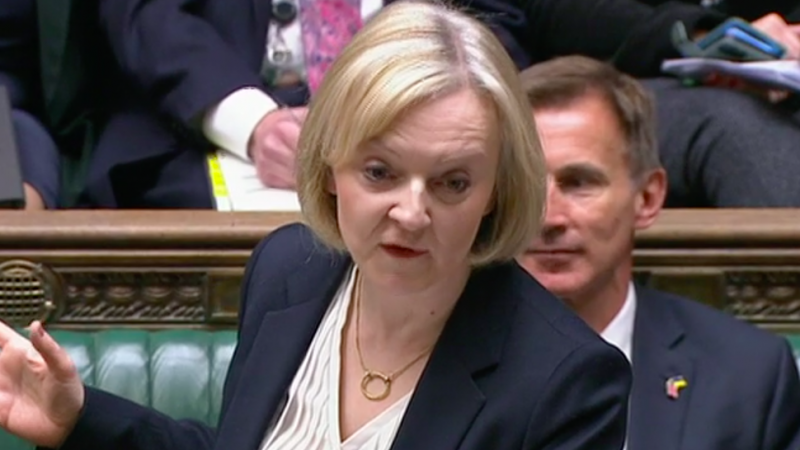While we have witnessed the drama and turbulence of recent weeks, a process of comparable significance to our economic future has been quietly proceeding in the background.

It’s been a dizzying few weeks in British politics. The shortest prime ministerial reign in history has drawn to a chaotic close, with the reversal of Liz Truss’ entire political agenda in the face of market panic followed inevitably by her resignation. Since Jeremy Hunt stood at the dispatch box and dismissed all but a few fragments of the sweeping tax cuts and wholesale deregulation we were promised only weeks ago were the one true path to growth, it has been just a matter of time.
In light of this humiliating rout, you might expect that the ideology behind the ‘mini-budget’ that sparked this political meltdown would be reeling, its credibility shattered after a brutal introduction to economic realities. But for all the apparent collapse of their influence at the top of government, there are reasons to be sceptical that Rishi Sunak and Jeremy Hunt are truly capable of putting economic stability and the long term interests of the country above a commitment to obsolete economic dogma.
While we have witnessed the drama and turbulence of recent weeks, a process of comparable significance to our economic future has been quietly proceeding in the background. The Financial Services and Markets Bill, a wholesale rewriting of the rules for our financial sector after Brexit is now proceeding through parliament, with the intention that it will pass into law in the first half of next year.
While ‘free-market’ zealotry may have suffered some major short term defeats in the last month, examining the contents of this Bill – authored under the leadership of Boris Johnson and Rishi Sunak – reveals an agenda that is also playing the long game through legislation. A central pillar of the new Bill will be to give our previously independent financial regulators a new objective – to promote the ‘international competitiveness’ of the sector they are supposed to police.
This an absurd proposition, that will fatally compromise the ability of regulators to carry out their role, and by extension further damage the already battered reputation of the UK economy as a safe and stable place to invest and do business. After all, like so many of Truss’ economic proposals, this approach has already been tried before and failed – ‘competitiveness’ as a principle for financial regulators was removed by the Treasury under the coalition government in 2012, after it directly contributed to the 2008 financial crash through undermining the independence of our financial watchdogs..
The continuing presence of this risky and destabilising proposition in the Bill is proof that the current problems with Conservative economic policy have deep roots. But unfortunately it is not the only problem with the Bill. The Financial Sector in the UK is a massive contributor to the climate crisis: UK banks, asset managers, and other financial institutions are responsible for nearly double the UK’s annual carbon emissions. The government has committed to Net Zero. And yet within the Bill as its stands, there is barely any mention of climate – and not one witness on the subject has been called to give evidence to the committee considering it. This is a disgraceful and irresponsible omission that will damage both the industry and the country in the long term. Despite a coalition of civil society groups calling for a rethink, and more than 50 economists writing an open letter to oppose these proposals, there have been no substantive changes thus far.
You won’t be surprised to learn that there are other problems lurking within this Bill, from the MiFID II reforms that could increase commodity speculation and food price inflation, to a lack of any of the increased transparency and accountability that should result from the supposed ‘return’ of powers from Brussels. Despite the dry technical language it is couched in, tens of thousands of people across the country are already expressing their opposition to this prospect.
But what would a truly future focussed and responsible Bill look like? Well firstly, it would learn from the mistakes of the past, and abandon the idea of any competitiveness objective for regulators. In its place, a secondary statutory objective for regulators to align the financial system with the UK’s climate change commitments should be introduced. Paired with a ban on fossil fuel companies listing on the London Stock Exchange, this could start to put the UK back on track to building an economy that actually has a future.
Understandably, much of the attention in the last month has been on the drama unfolding in and around number 10, and the resulting economic chaos. But while a new Conservative leadership team attempts to clean up their own mess, we should not lose sight of the deeper and perhaps even longer term mistakes they are continuing to make. If this Bill goes through as it stands, it will deeply damage the future prospects of our country, and the wider world. Despite this, it has faced all too little opposition. Disappointingly, the Labour leadership, while decrying removal of the cap on bankers’ bonuses, has actually come out in support of the main pillars of the Bill, including the competitiveness objective, out of a seeming desire to avoid being seen as ‘anti-city’. The reality is, this will be bad for all of us, and those who claim to want a better future economy need to step up now to fight it.
(Picture credit: Youtube screengrab)
To reach hundreds of thousands of new readers we need to grow our donor base substantially.
That's why in 2024, we are seeking to generate 150 additional regular donors to support Left Foot Forward's work.
We still need another 117 people to donate to hit the target. You can help. Donate today.



